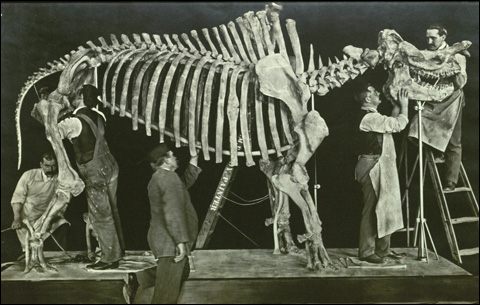
DEM BONES: PBS’s documentary about two pioneering, feuding paleontologists is as involving as a piece of tragic theater — and certainly more memorable than any prime-time fiction. |
Sometimes you want to give PBS a big grateful kiss just for staying the course while most of TV, losing ground to the interweb age, hovers between cultural hemorrhage and commercial death. The season's new episodes of American Experience — "Dinosaur Wars" (WGBH, Channel 2, January 17 at 9 pm), a soap-operatic look at the birth of American paleontology, and "Panama Canal" (January 24 at 9 pm), a documentary devoted to the digging of that mega-ditch — provoke exactly that loving impulse.
"Dinosaur Wars" recounts one of those obscured major stories from the dark underbelly of science. Two pioneer American paleontologists, Yale-based Othniel Charles Marsh and self-taught Philadelphia Quaker Edward Cope, all but invented their field. Between them, in the decades following the Civil War, they unearthed thousands of fossils from the exposed-rock landscapes of the American West and identified roughly 130 dinosaur species. They also collected crucial fossil evidence of Darwinian evolution, putting the US at the center of late-19th-century scientific inquiry.
Oh, yeah; they hated each other. Professional slights and personal antagonisms denied these giants the partnership that the nascent field deserved. Instead, they spent their careers revolutionizing our understanding of the earth's history while deceiving and otherwise aggravating each other with dirty tricks and self-promotional stunts to the extent that each died relatively young, exhausted, and bankrupt. At the height of their most childish spate of bickering, Marsh went so far as to have valuable fossils destroyed rather than leave them behind for Cope to claim.
Almost everything the average person today knows about dinosaurs (as well as a hefty portion of the current paleontological canon) is based directly on the work of Marsh and Cope, but their at-the-time very public feud and shameless competitive tactics have, for the most part, been buried with their bones. Treating the nasty rivalry without taking sides (though Cope does come off as the more sympathetic combatant), "Dinosaur Wars" gives us a detailed, well-documented melodrama that's as involving as a piece of tragic theater — and certainly more memorable than any prime-time fiction.
The building of the world-changing 48-mile canal across the treacherous Isthmus of Panama has been heralded as a monument to American engineering and project management and damned as a flagrant display of high-handed imperialist expansion. It was both, and American Experience addresses the opposing sides of its history. "Panama Canal" lauds chief engineers John Stevens and George Goethals for their tenacity in defeating yellow fever and their problem-solving genius in enabling ships to scale mountains (via locks), but the program also notes that Teddy Roosevelt's duplicitous scheme to wrest the isthmus away from Colombia signaled the loss of America's reputed moral superiority on the international stage.
It took nine years, $350 million, and 5000 fatalities to conquer the isthmus, whose climate and terrain had bedeviled everyone from Spanish explorer Vasco Núñez de Balboa to pirate Henry Morgan to Suez Canal builder Ferdinand de Lesseps. But the victory decisively inaugurated the American Century — and, for better and worse, changed the way the US looked at itself. Finally, some reality TV you can believe in.